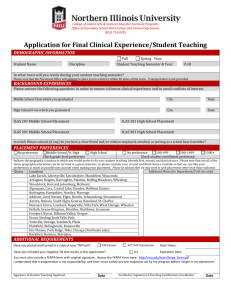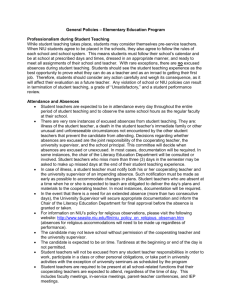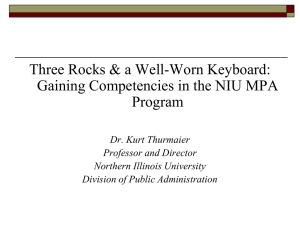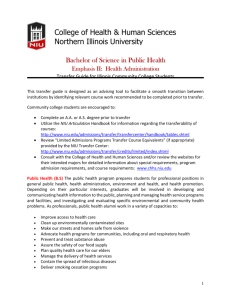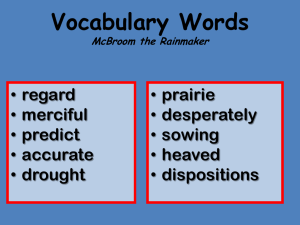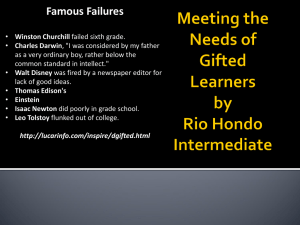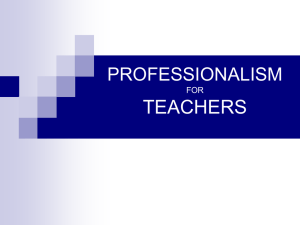ILAS 201
advertisement
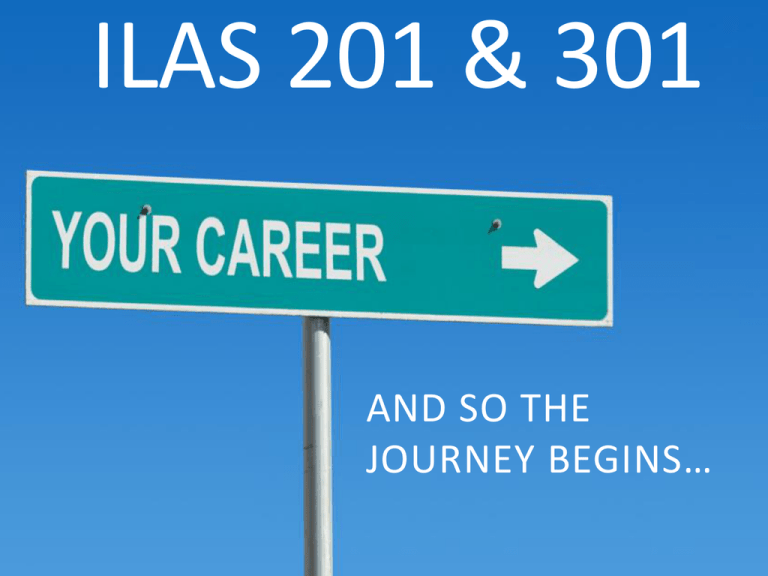
ILAS 201 & 301 AND SO THE JOURNEY BEGINS… INTRODUCTIONS Kathryn Maley, kmaley@niu.edu • Former teacher • Assistant Director of The History & Social Sciences Secondary Teacher Education Program • NIU / DHS PDS Leader • Coordinating Instructor for ILAS 201 and 301 A LITTLE ABOUT MYSELF Favorite color: Purple Likes: Nice students, social studies, anything shiny Dislikes: Mean people, lettuce Research interests: Student retention in clinicals Something interesting about me: I worked on a dairy farm to pay for college. OFFICE SUPPORT SPECIALIST Jodi Long, jodilong@niu.edu • Mrs. Long is AWESOME • Office of School Partnerships and Clinical Experiences, Zulauf 215 • Open daily – 8:00-4:30 • Best to call to make an appointment DISCIPLINE COORDINATORS These are the your NIU program contacts English – Mrs. Judy Pokorny Foreign Language – Ms. Peggy Batty History – Dr. Andrea Smalley Math – Ms. Renee Olsen Science – Mrs. Judy Boisen 201 SMALL GROUP FACILITATORS English – Mr. Ben Doty, Sycamore High School Ms. Kelsey Mapes, HBR High School Foreign Languages – Mr. Ben Doty, Sycamore High School HistoryMr. Jeff Villarreal, Sycamore High School Math – Ms. Sheryl Nakonechny, Clinton Rosette Middle School 301 SMALL GROUP FACILITATORS English/Foreign Language – Mr. Mike Rice, Kaneland High School History – Mr. Ata Shakir, DeKalb High School Math – Mrs. Amanda Baum, Clinton Rosette Middle School Science – Ms. Jennifer Stoll, DeKalb High School 301 TO SMALL GROUPS ENGLISH/FOREIGN LANGUAGES E106 HISTORY E107 MATH E108 SCIENCE E109 Please return to Forum Room at 5:15pm ILAS 201 COURSE PACK HIGHLIGHTS Contact information and website address http://niu.edu/tcert/clinicals/introductory_clinical/index.shtml Attendance policy School Contact information Privacy of Student Data signature – to Ms. Maley by January Dispositions Assessments What to do during observations Assignments Time Logs Final Assessments 26 PRIVACY OF STUDENT DATA Found in the Course pack Due to me on or before January 26 DISPOSITIONS: THE WHAT We have a dispositions process To ensure that you have the necessary “soft” skills to be a professional educator To identify areas of concern early so that intervention and remediation are possible Because we want you to be successful! See the ILAS 201 Course Packet for all Dispositions Forms. DISPOSITIONS: THE “WHAT IF?” What if I get a Dispositions Alert? You will be notified by me or your program coordinator that there has been a dispositions alert. You will schedule a meeting with your program coordinator to discuss the situation and possible solutions. You and your program coordinator will create a mutually agreed upon remediation plan and date for reevaluation. DISPOSITIONS PYRAMID WHAT TO DO DURING OBSERVATIONS Don’t just sit quietly in the back! Offer to help hand out papers Circulate around the room and offer to help students who need assistance Check out the “What to Do During Observations” handout in your course pack for some awesome ideas on what else you can be doing to make the most of your experience! ASSIGNMENTS Links to all of the assignments are on website! Mandated Reporter Academic Integrity Due by January 26 Tutoring Scenario Activity Teacher Interviews Due January 26 Start scheduling at first meeting! TIME LOGS • You will have 3 different sets of time logs: • Middle School Time Logs • High School Time Logs • Tutoring Time Logs Submit on 3 separate pages! Don’t forget to get them signed! FINAL ASSESSMENTS There are four final assessments: Cooperating Teacher (2) Tutoring Supervisor Small Group Facilitator Give the evaluation form to the evaluator 2 weeks prior to when you need it. This will give the evaluator time to reflect on your performance and return your evaluation to you before it is due! TAP TEST If you have not yet taken and passed the TAP test, start the process NOW! Check out our website for links to places on campus that can assist you. TUTORING SCHEDULING FORM DUE BY January 16th DO NOT MESS THESE UP! PLACEMENTS IT’S THE LITTLE THINGS TRANSITIONING FROM A STUDENT TO A PRE-SERVICE TEACHER OUR JOB IS TO HELP YOU FIND A JOB. TODAY’S OBJECTIVES After this presentation you will be able to: •Identify the “little” things you can do to help you exhibit the qualities of a high caliber professional . •Identify the differences between “student” thinking and “pre-service teacher” thinking. SOCIAL MEDIA ESTABLISH A PROFESSIONAL INTERNET PROFILE All existing social media set to private – don’t forget about Pinterest, Instagram, your friend’s pages, your high school MySpace page… Join professional social media sites – LinkedIn Pinterest and Instagram CAN be used by teachers very effectively – make a separate account THE LITTLE THINGS: CLOTHING Dress for the position you want, not for the position you have. Professional dress expected every time you are in a school building (except for Monday seminars). Jeans are NEVER ok. Not even on Fridays. Not even during Spirit Week. Not even if your teacher says it is ok. NEVER. THE LITTLE THINGS: WRITING Proofread everything you write: • Personal Statements • Applications • E-mails • Tutoring forms • Attachments – Are they there? Are they complete? Spelling errors, grammar errors, informal language – all could mean the difference between landing the interview and landing in the recycling bin! Treat written work like an audition, not like an obligatory assignment. EMAIL ETIQUETTE Google first! Read your email Compose your reply Read reply out loud before sending Send reply THE LITTLE THINGS: READING Read all directions carefully and make sure that you follow them to the letter. Re-read directions at least twice (if not more) before completing the task. READING – CONTINUED Before contacting the school, cooperating teacher, small group facilitator, or Ms. Maley, make sure that the question you are asking isn’t already answered somewhere • Course syllabus • ILAS 201 Website • Google • School website • Classmate • Previous E-mail If you’ve done all of this and you’re still not sure, ask for help! “I’m so sorry to bother you” is an EXCELLENT stock phrase. THE LITTLE THINGS: COMMUNICATION Communicate BEFORE the fact, not after. 24 hour rule – for you, but don’t expect it from others. If you say you are going to do something, do it. If someone helps you, thank them. You are dealing with humans. Mistakes happen. Teachers must be flexible. It’s not what you say, it’s how you say it. Try very, very hard to avoid assumptions. Mr./Ms./Dr. ALWAYS THE LITTLE THINGS: QUESTIONS Don’t be afraid to ask questions. Make sure that: • Questions haven’t already been answered in class • Questions aren’t answered in the material you have • Questions aren’t easily answered by an internet search • Questions come before the assignment due date. SAMPLE EMAIL Good Afternoon Mrs. Bickley, After attending the middle school orientation yesterday at XYZ Middle School, the cooperating teacher, Mrs. Soandso, and I discovered a dilemma. She only teaches science at XYZ, not social studies. Although I believe I could brush up on my science skills the best that I can, it does conflict with my concentration of history/social studies. I just wanted to bring this to your attention before moving any further with Mrs. Soandso. We thought it was best to figure this thing out before setting a schedule and proceeding with observations. Thank you for your time and effort. Best regards, EMAIL TEMPLATE Salutation – always use Mr. or Ms. (Dear Ms. Jones) Introduce yourself – don’t assume they remember you or what you do (My name is Bob Smith, and I am a History teacher candidate at NIU) Ask your question or state reason for email – KEEP IT SHORT AND TO THE POINT Thank person (Thank you so much for your time.) Closing (Sincerely, Bob Smith) THE LITTLE THINGS: CHAIN OF COMMAND NIU Faculty –Ms. Maley, Discipline Coordinators, Small Group Facilitators, Advisors Cooperating Teacher School Administration Most formal and least contact THE LITTLE THINGS: ORGANIZATION Due Dates • Due dates are important and should not be missed. Look through all of your materials and make a calendar to help stay organized. Time Commitments • Schools are busy. You are guests. If you say you will be there on a specific day and time, be there. No excuses. • Emergencies do happen. If they happen to you, contact your cooperating teacher in advance (if possible) by phone and e-mail. C.C. Ms. Maley on the e-mail. THE LITTLE THINGS: ORGANIZATION Paperwork • Teachers have to track thousands of pieces of paper a week. Pre-service teachers do too. Read all paperwork carefully, follow directions completely, and submit things on time. Make copies • Make copies of ALL important forms before you submit them from this point forward THE LITTLE THINGS: DOING MORE To make yourself a truly exceptional candidate you need to do MORE, and you need to stand out. We are helping you begin this process by having you tutor as part of your ILAS 201 experience. Ways you can do more: • Offer to help out with additional things at your placement school • Look for volunteer opportunities in your community working with school-aged children • Get involved with something at NIU or your hometown. Interesting experiences make for interesting resumes! DOING MORE Start thinking about your marketability • ELL? • Second language? • Endorsement in another subject? • Reading coursework? • Unique opportunities Ask Yourself This: What will make you different from all of the other people who are applying for the same job? ANY QUESTIONS?
